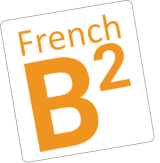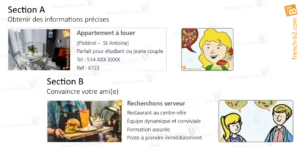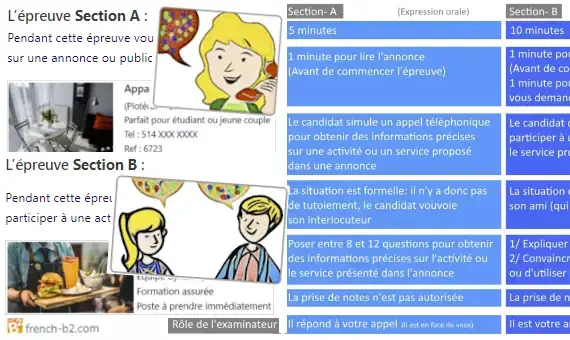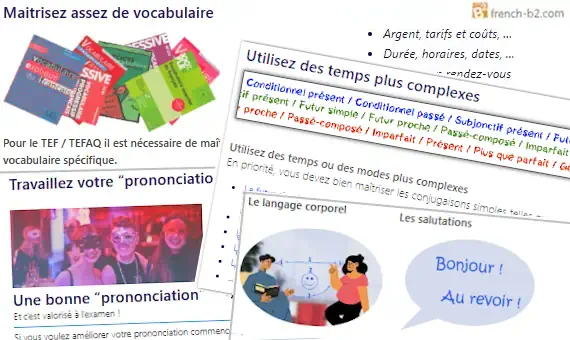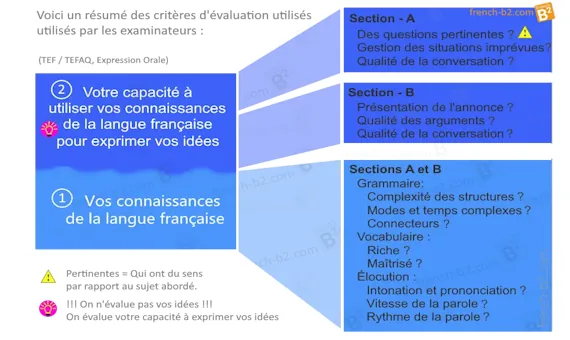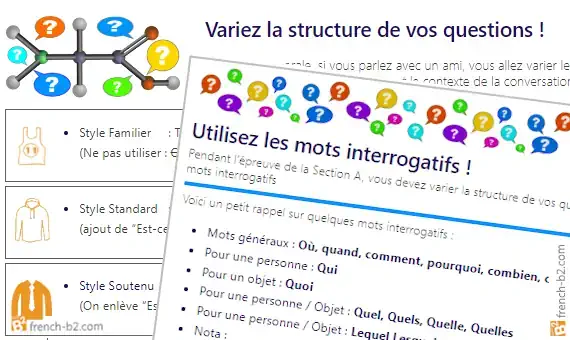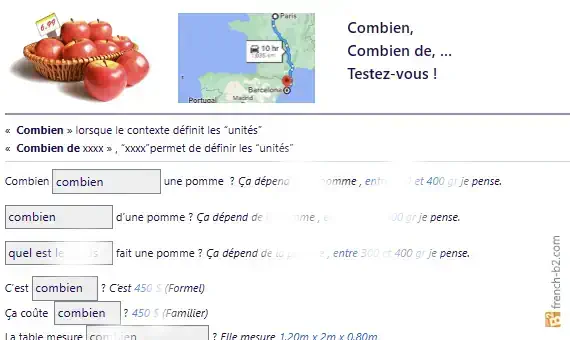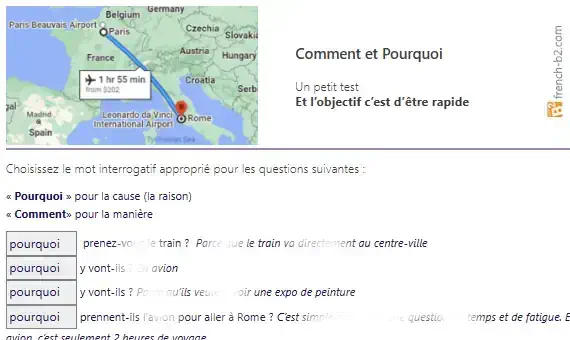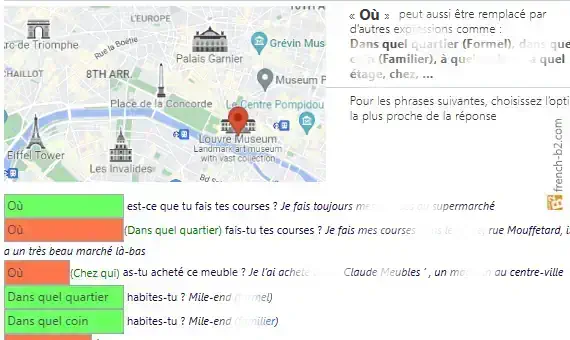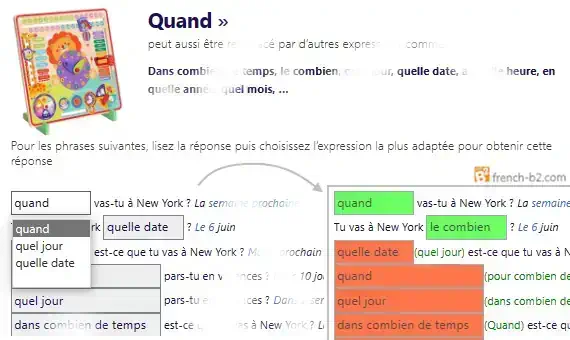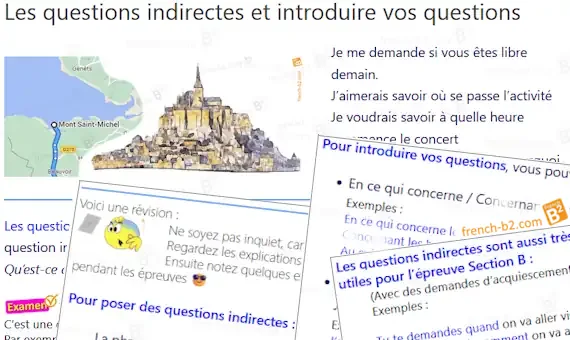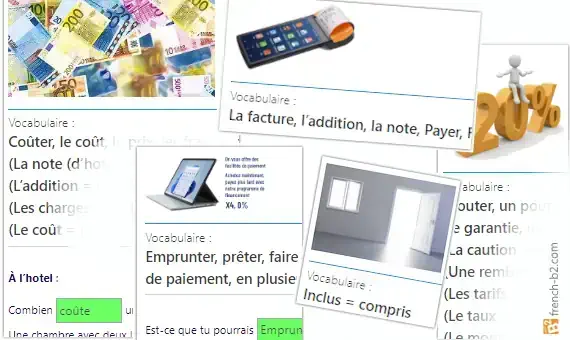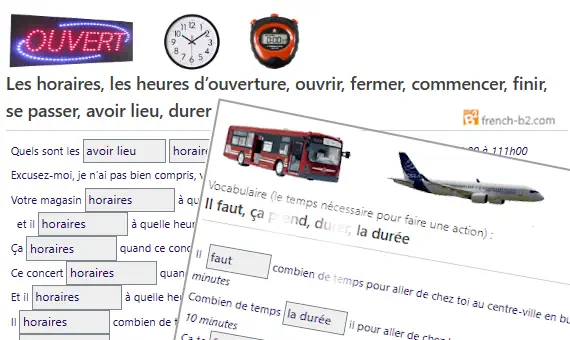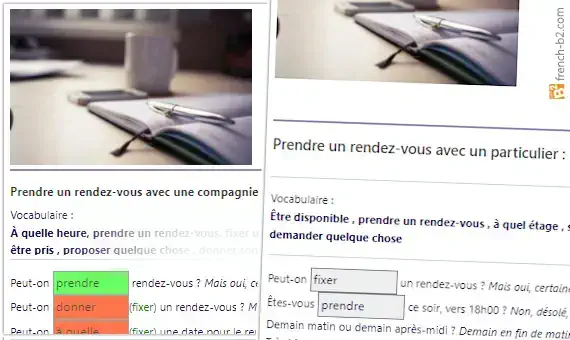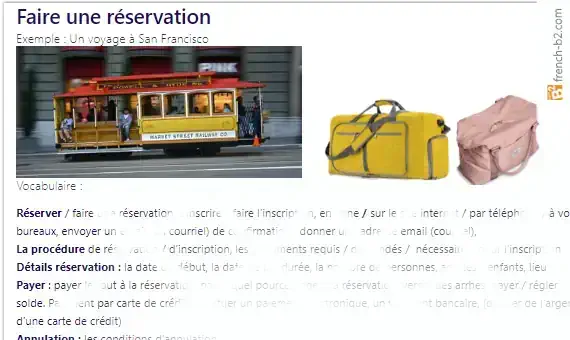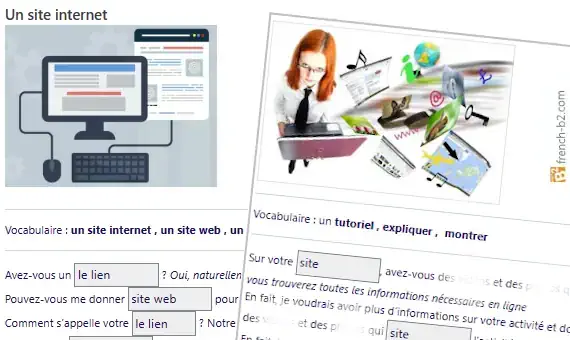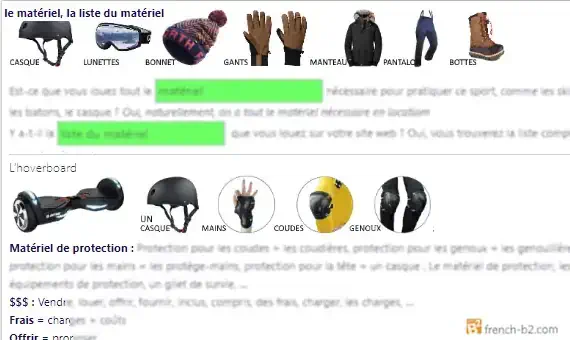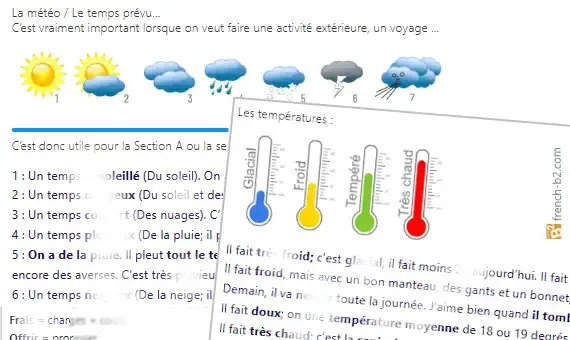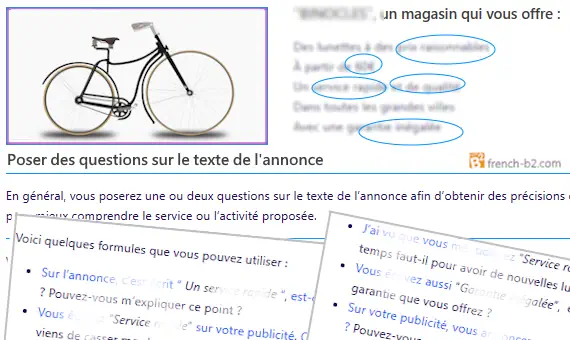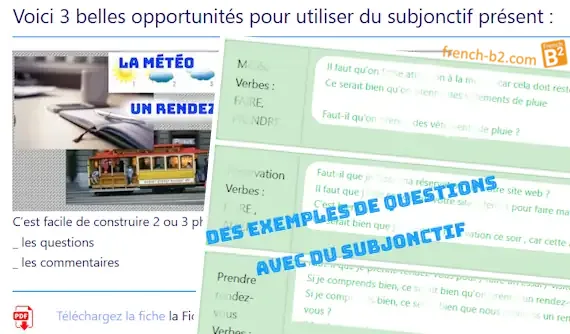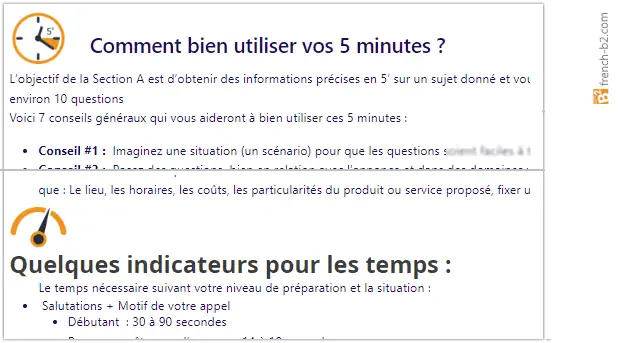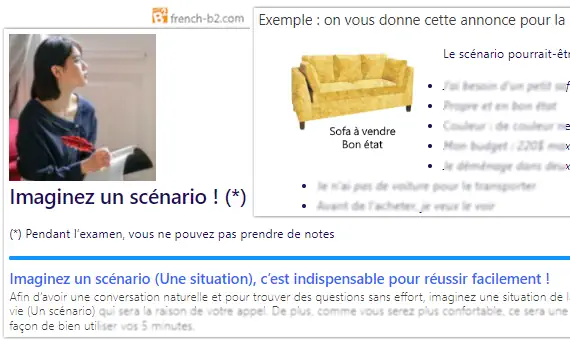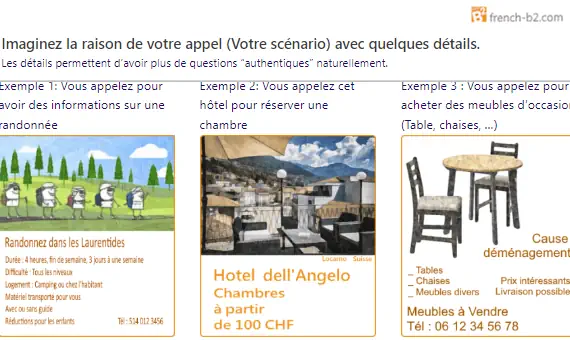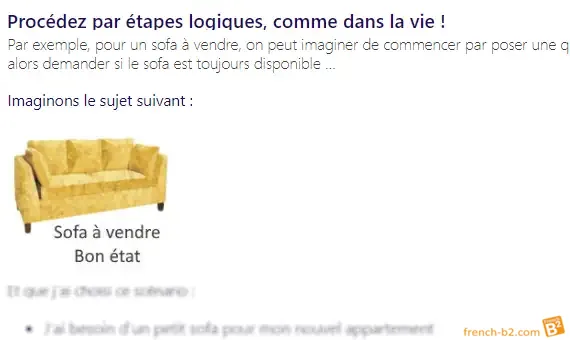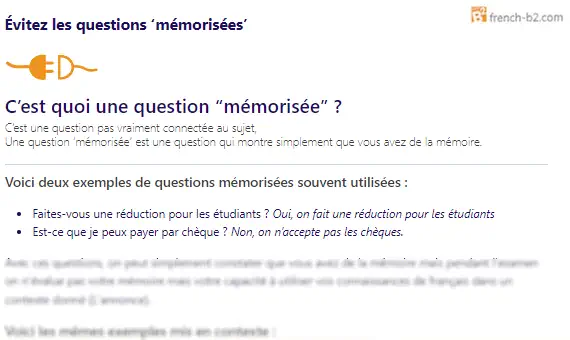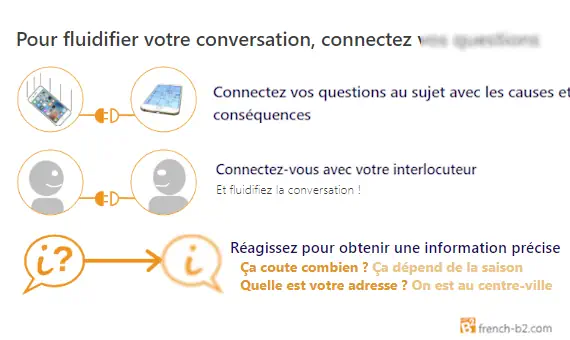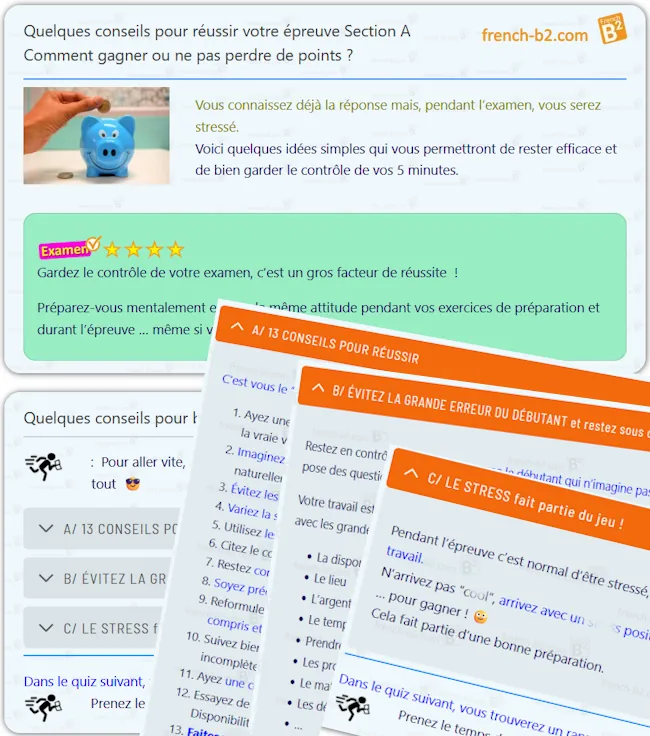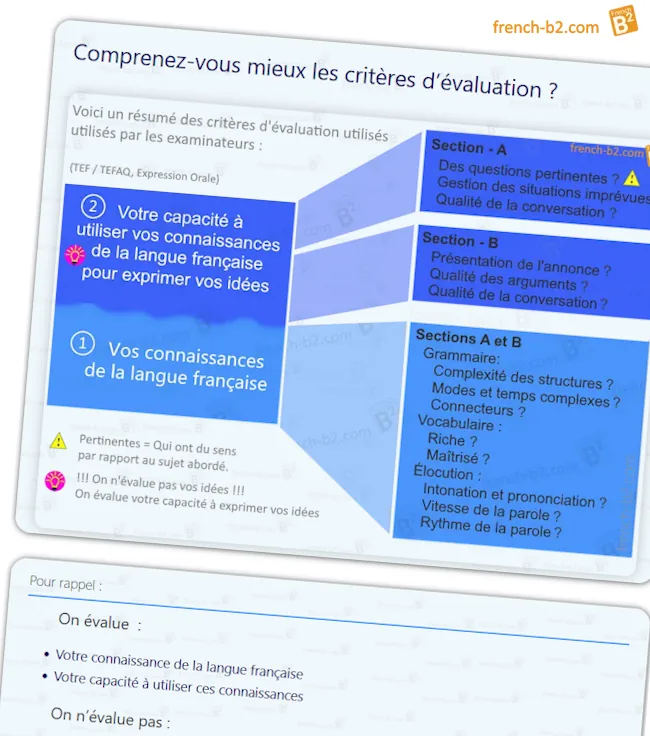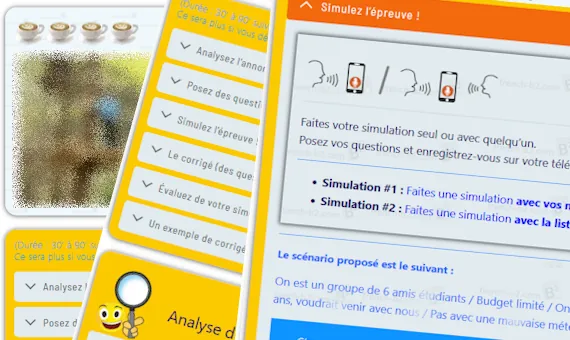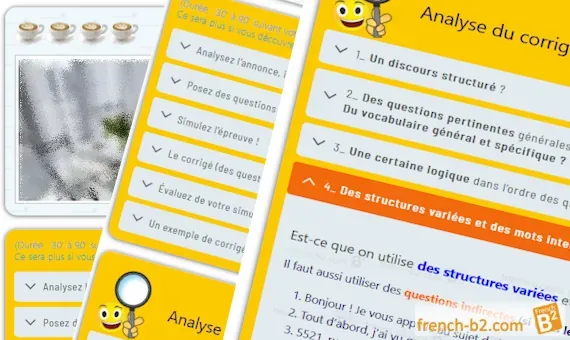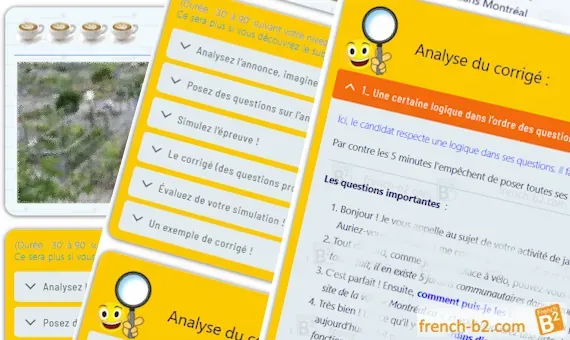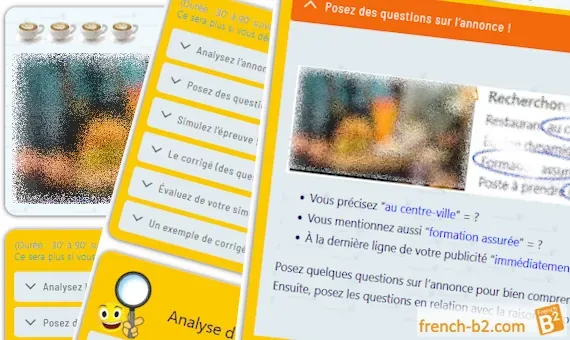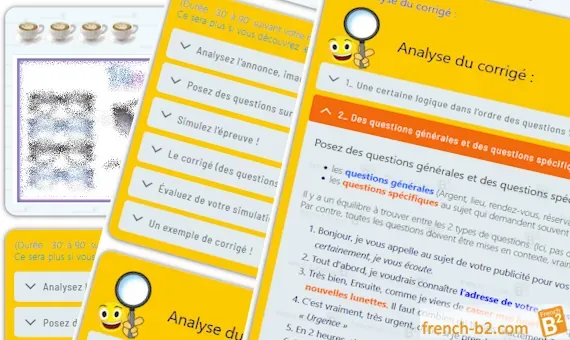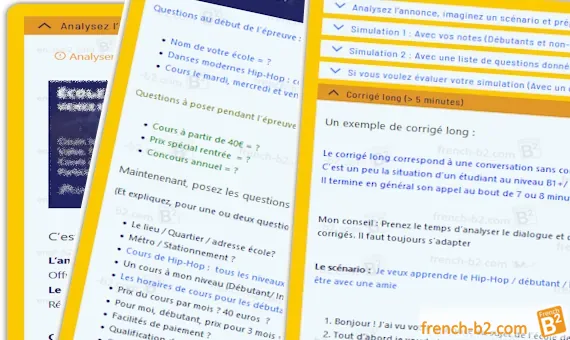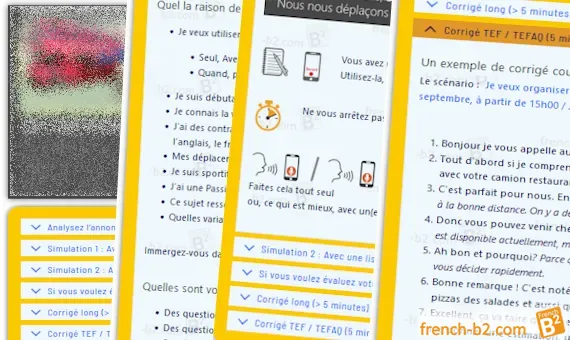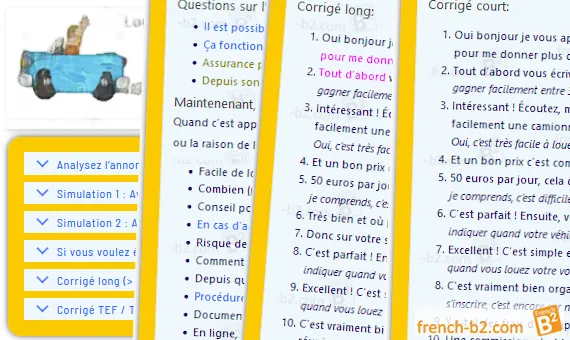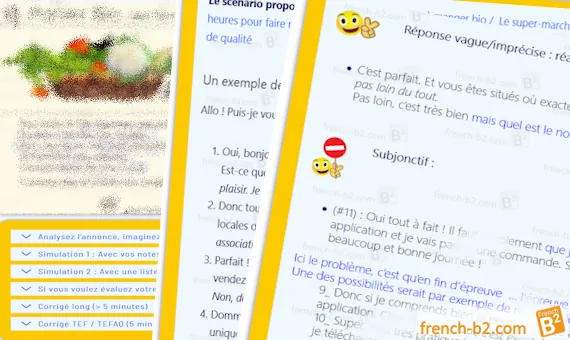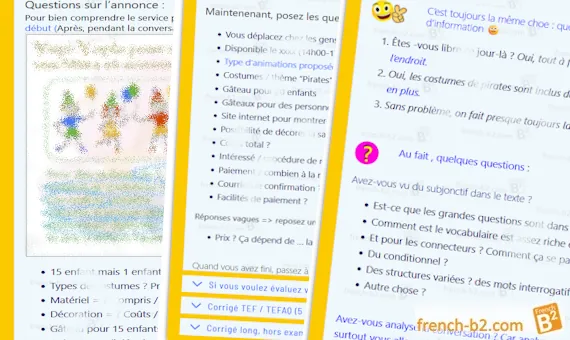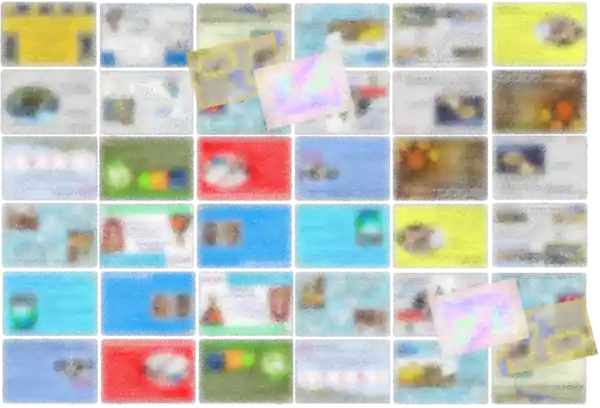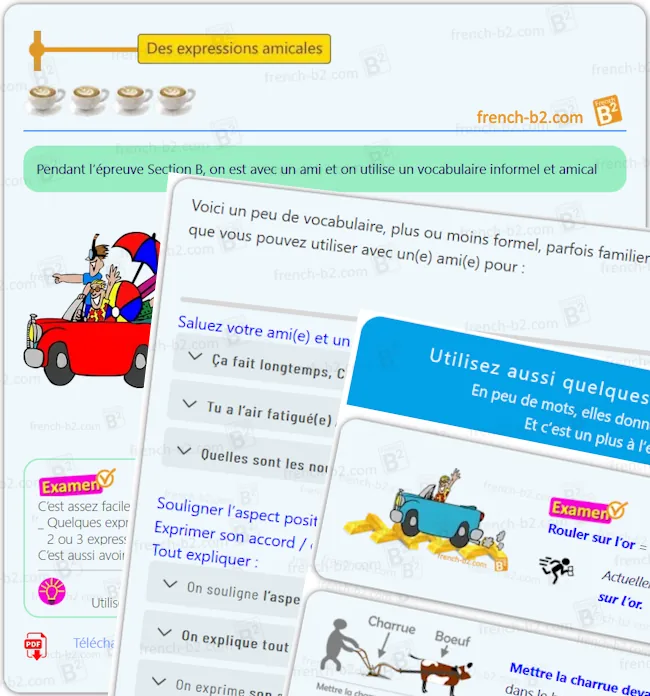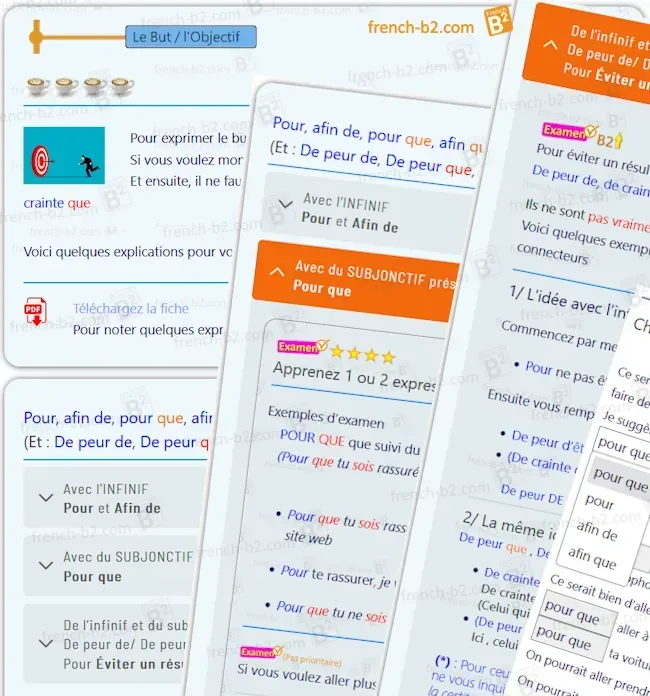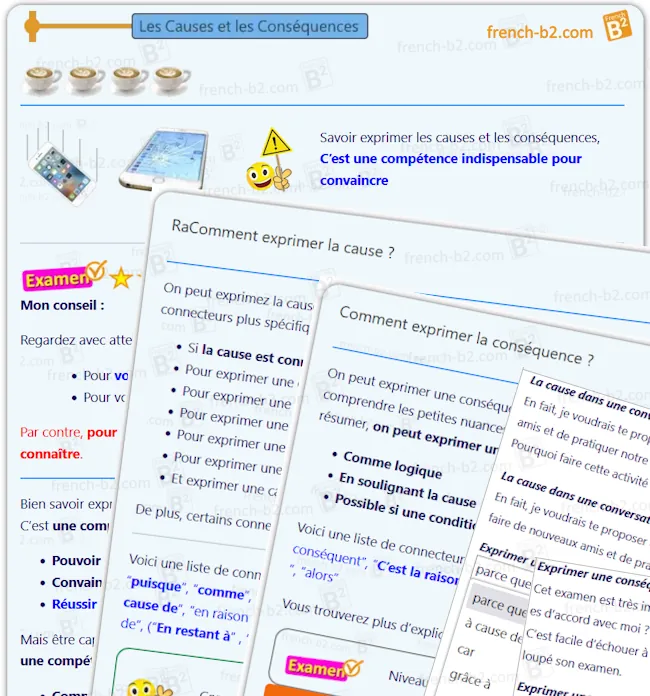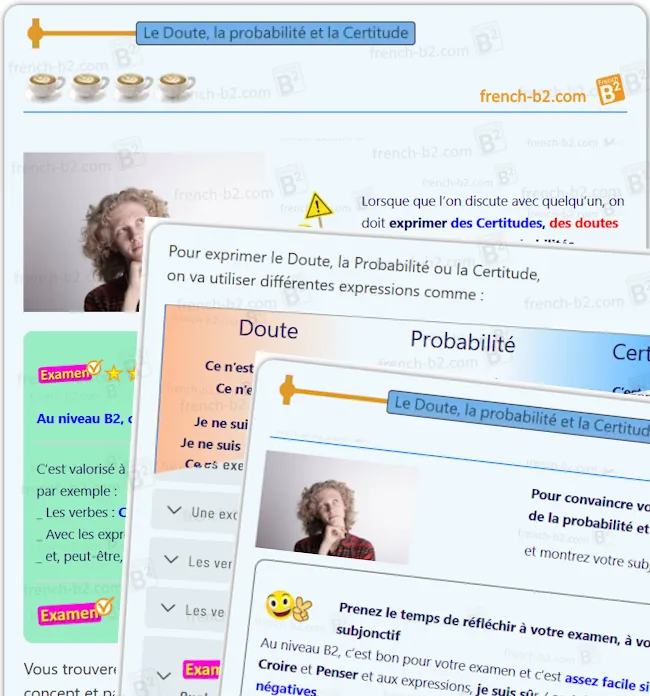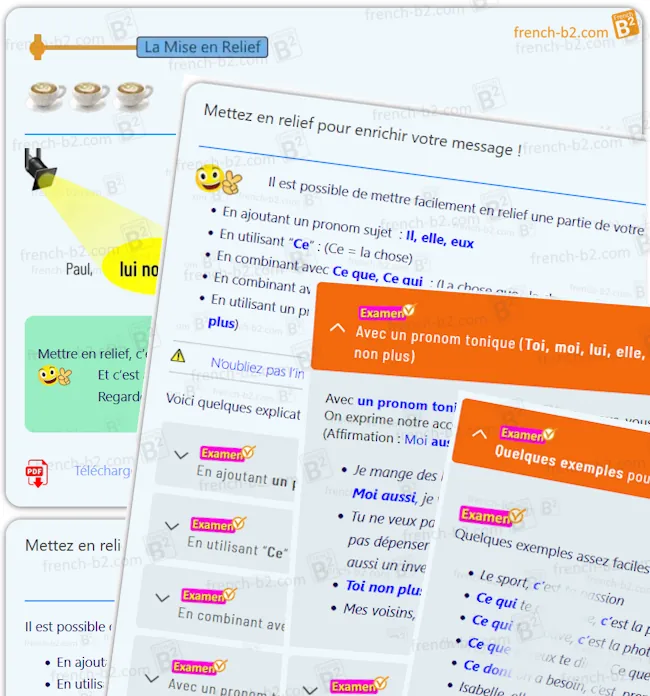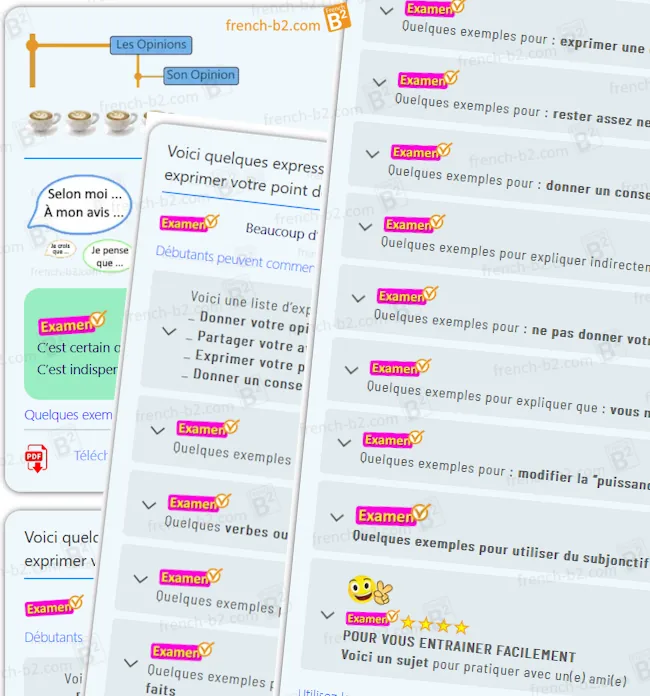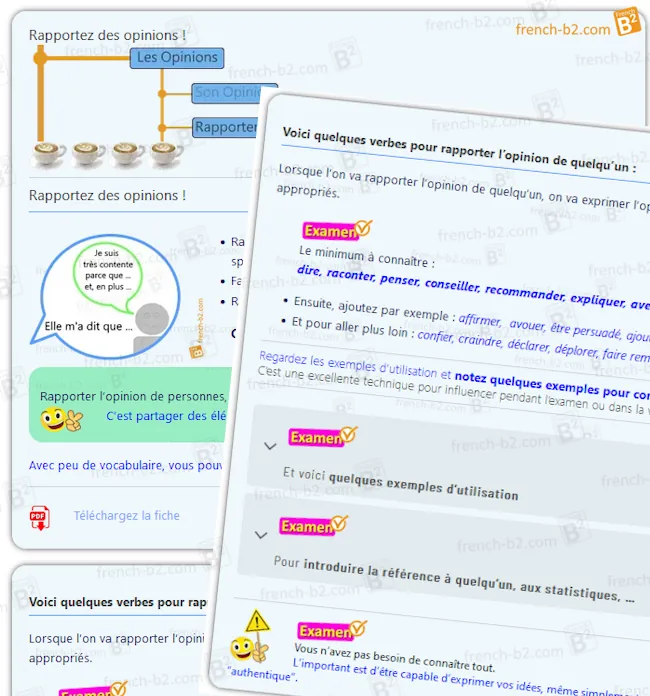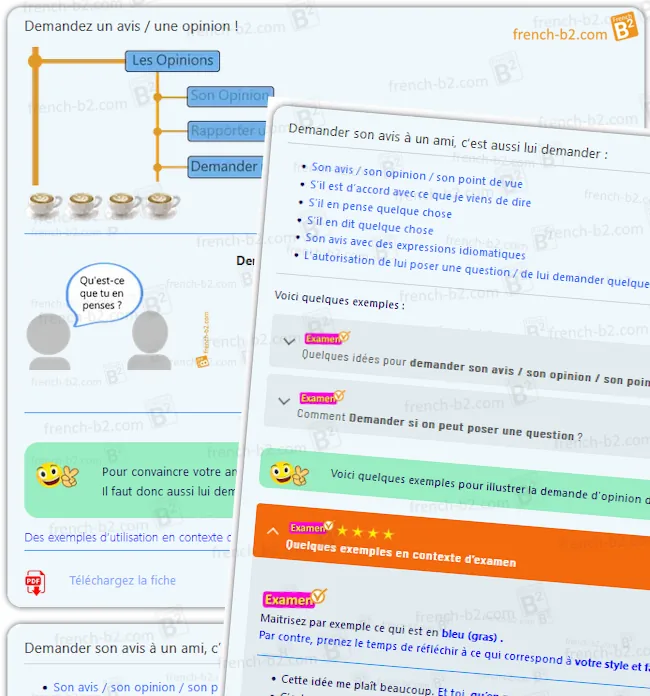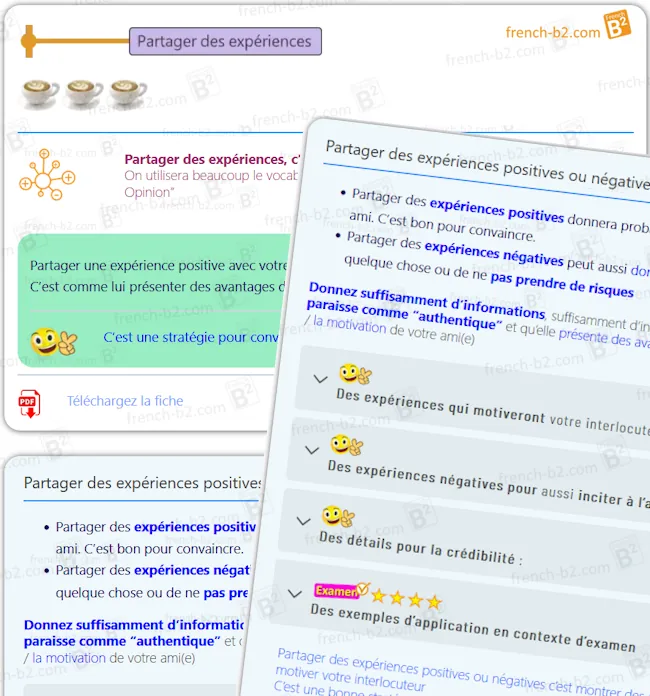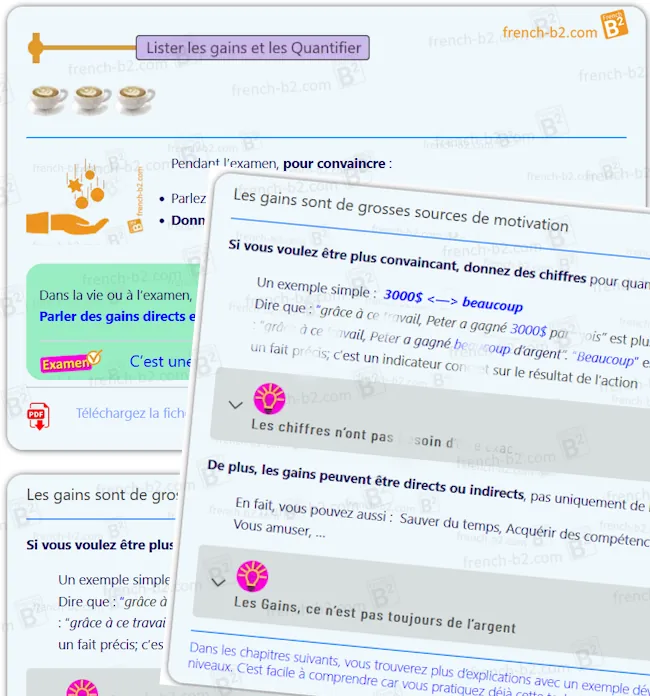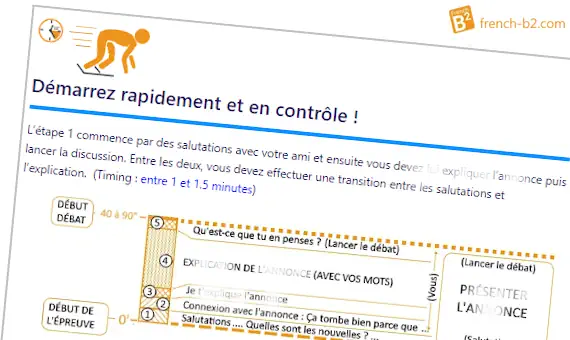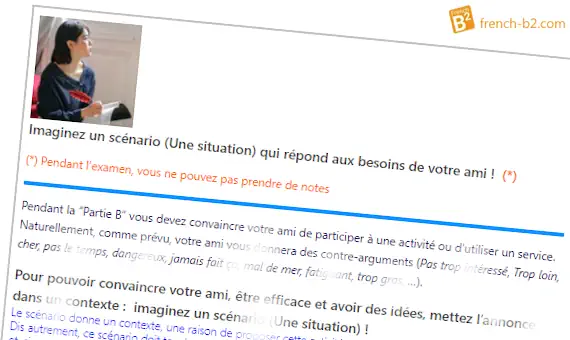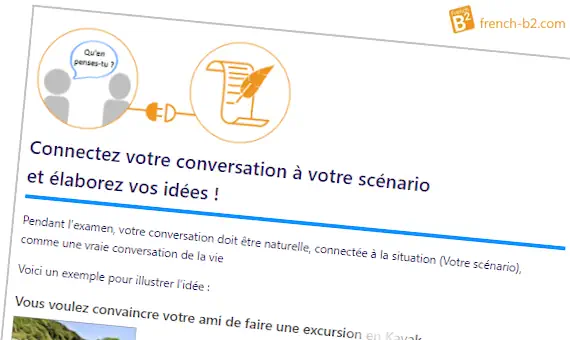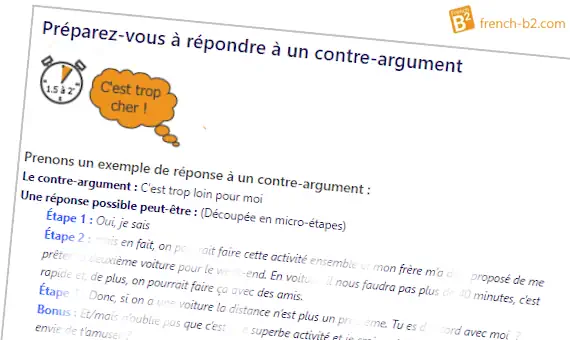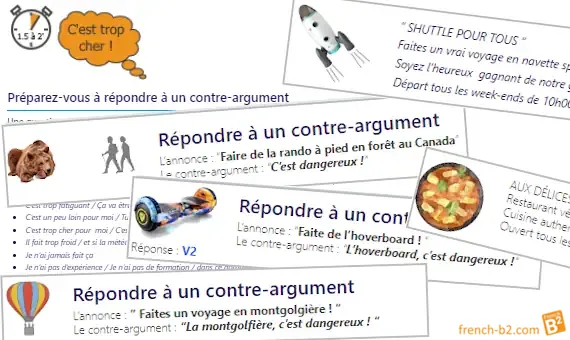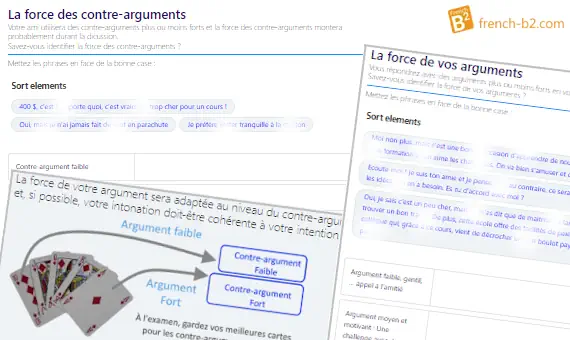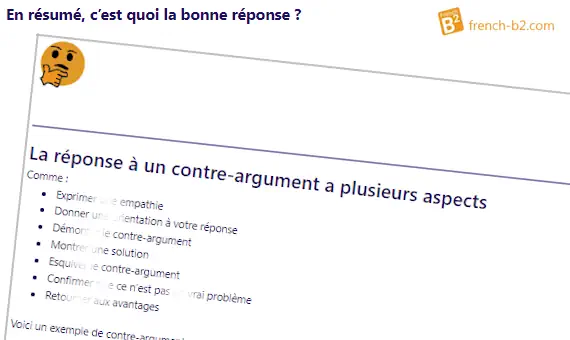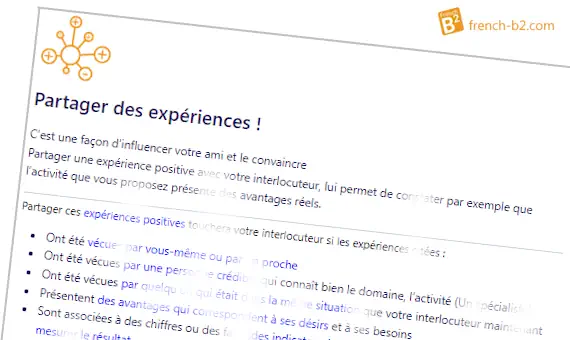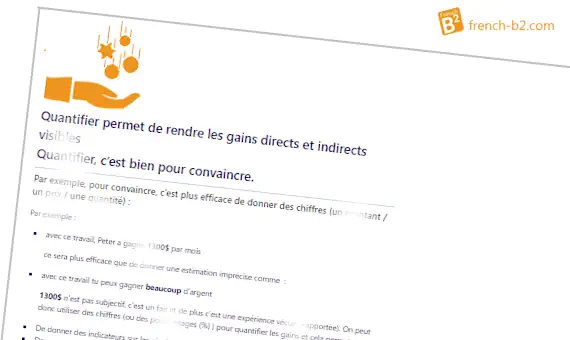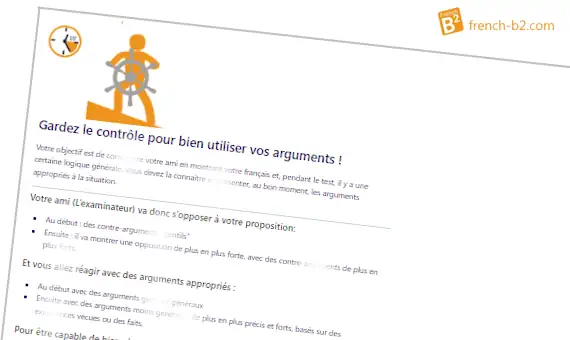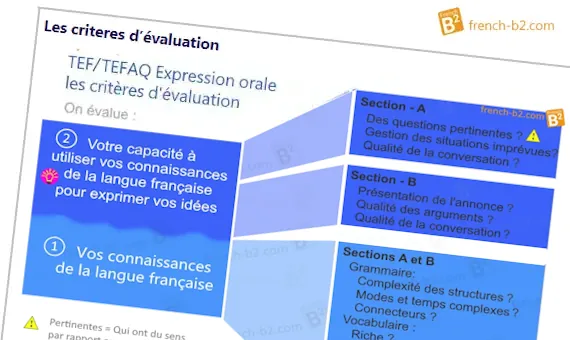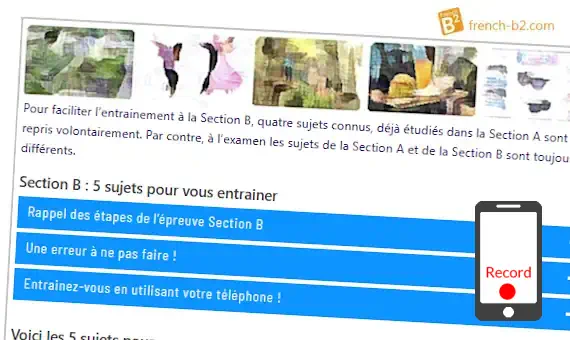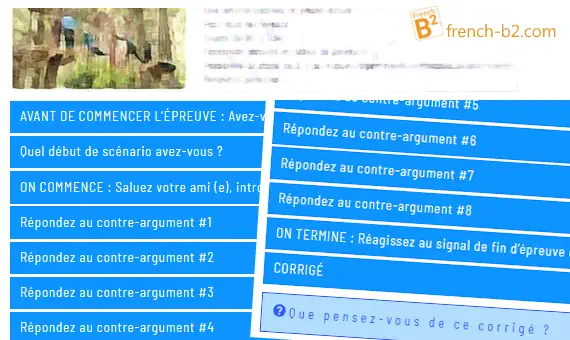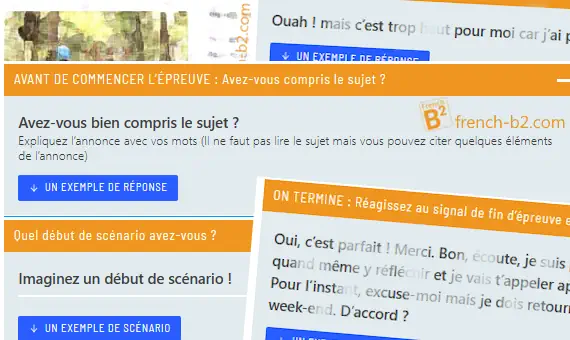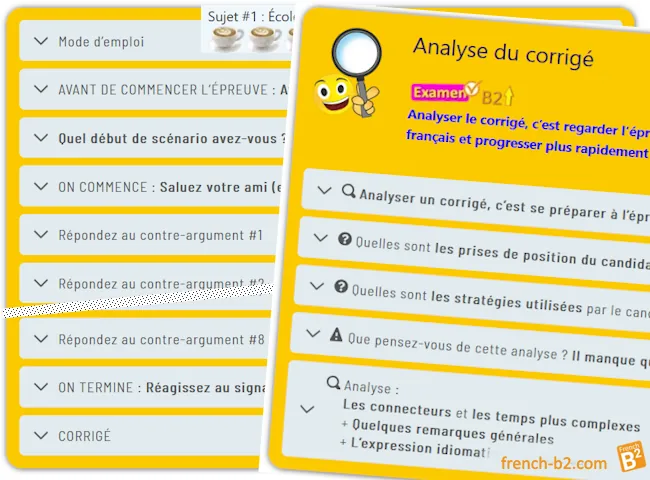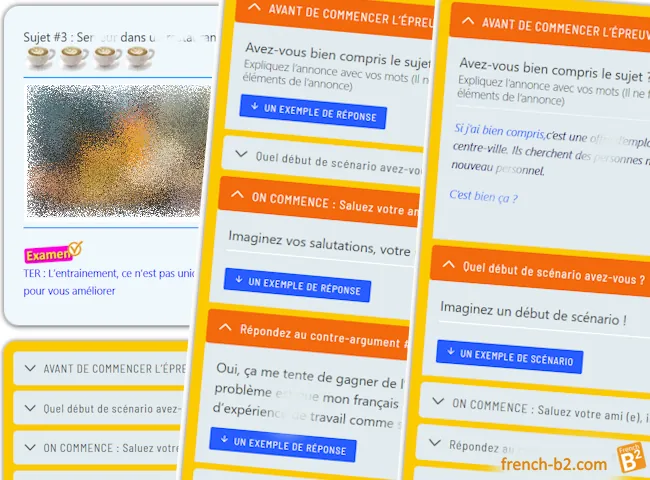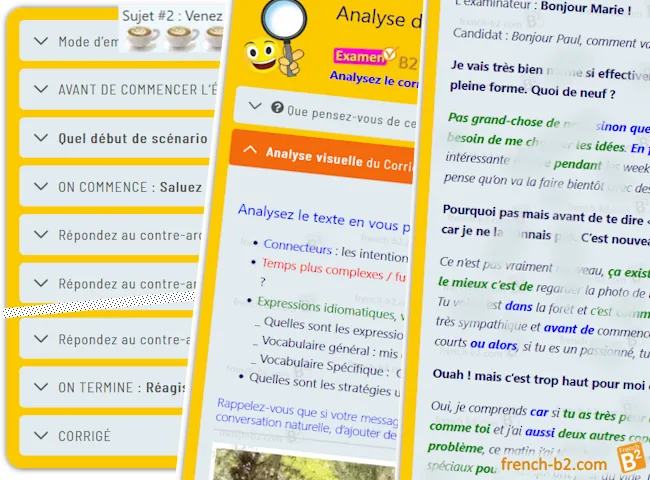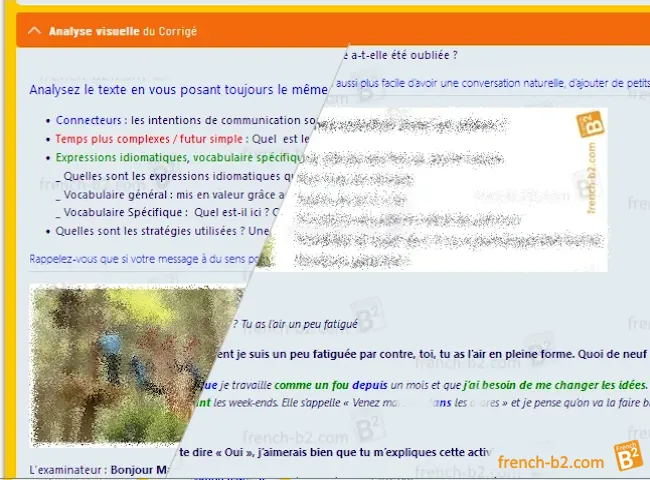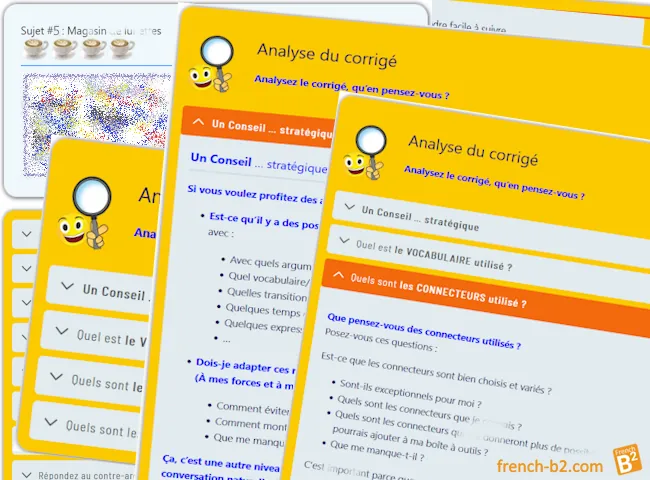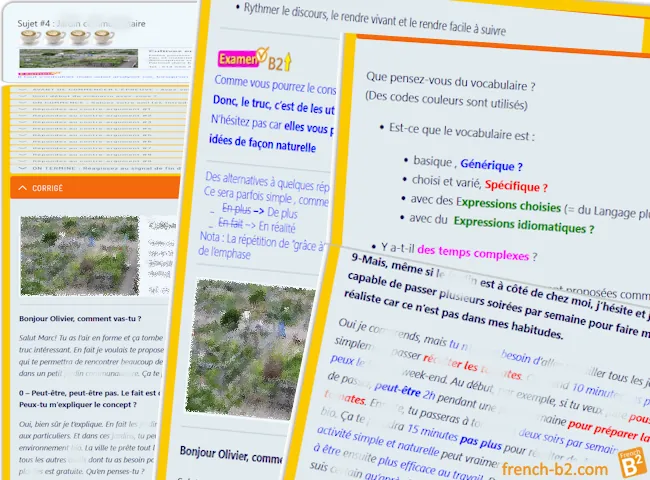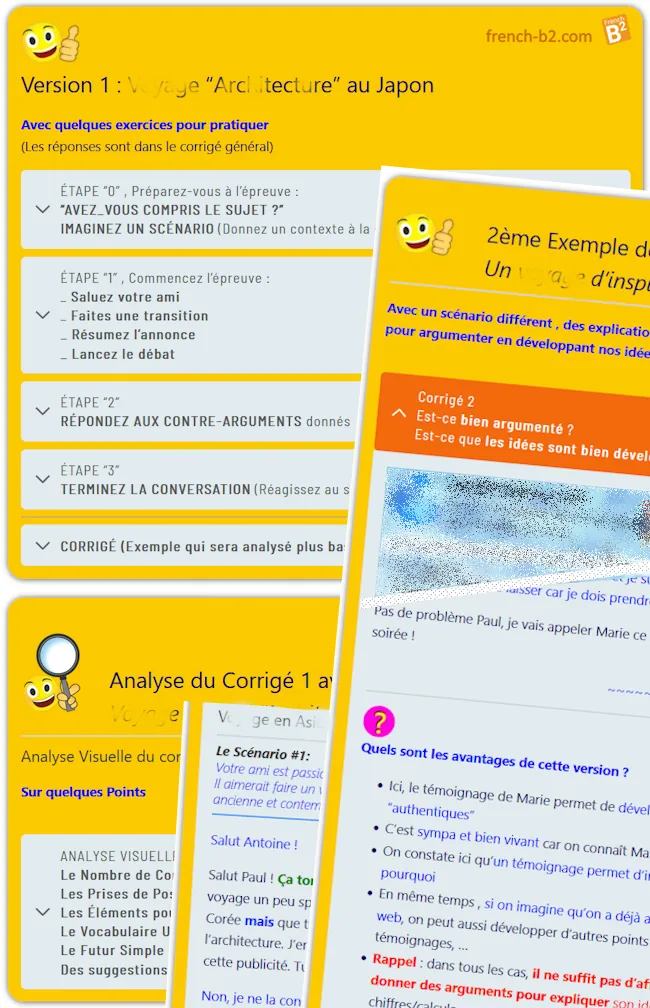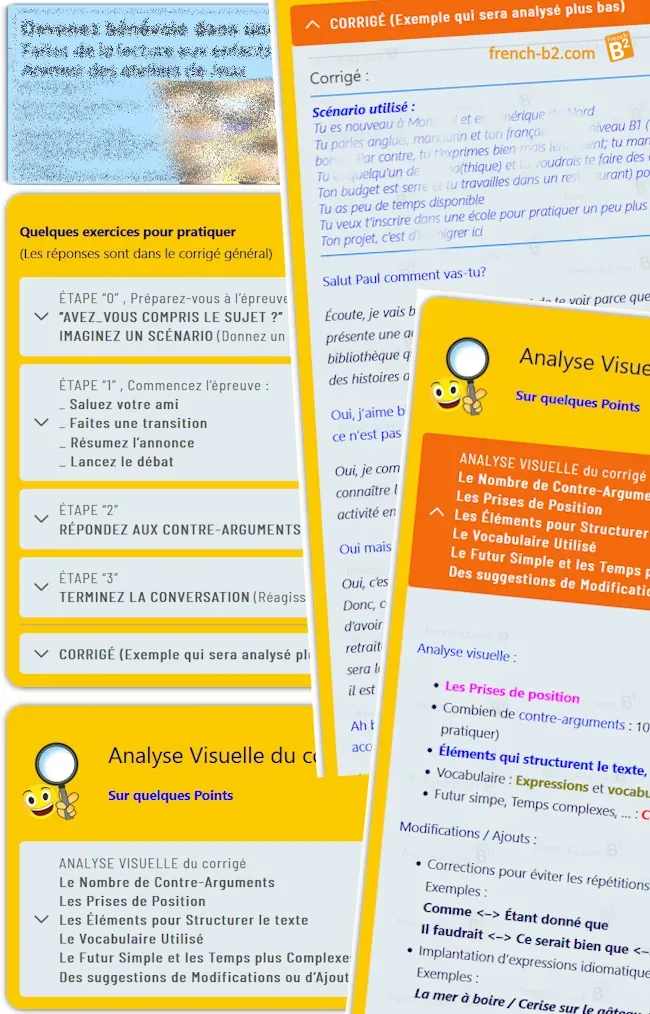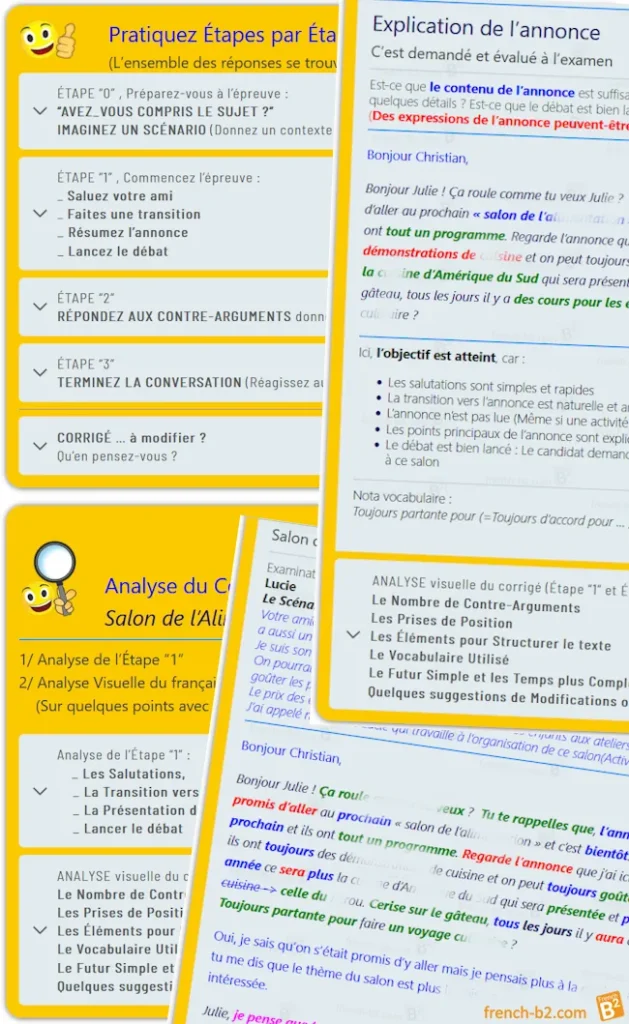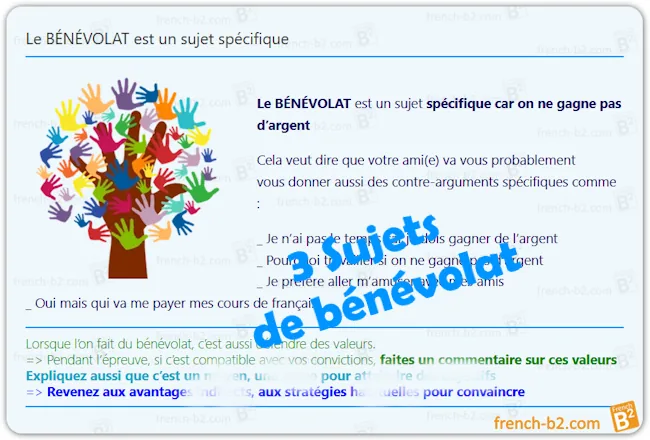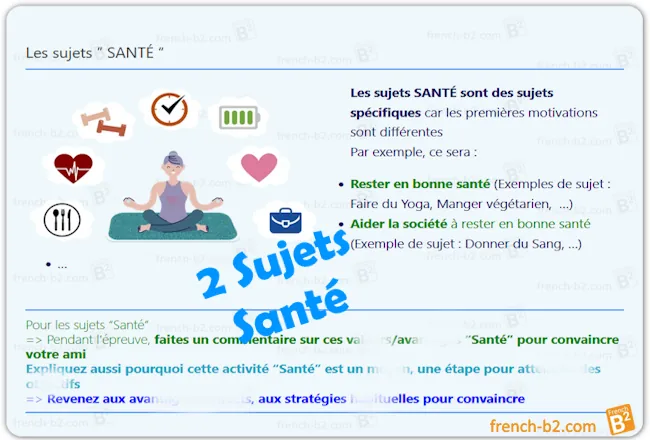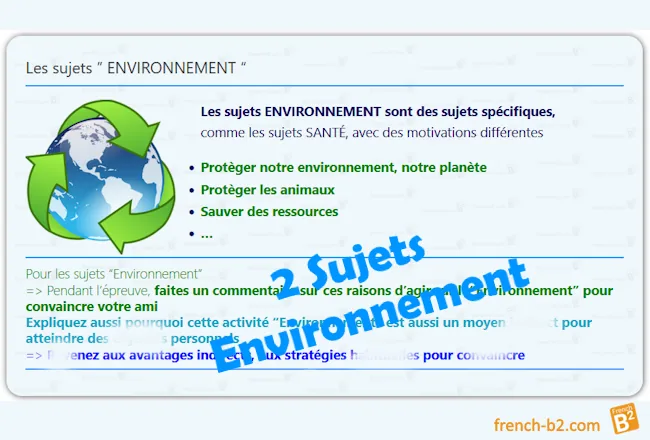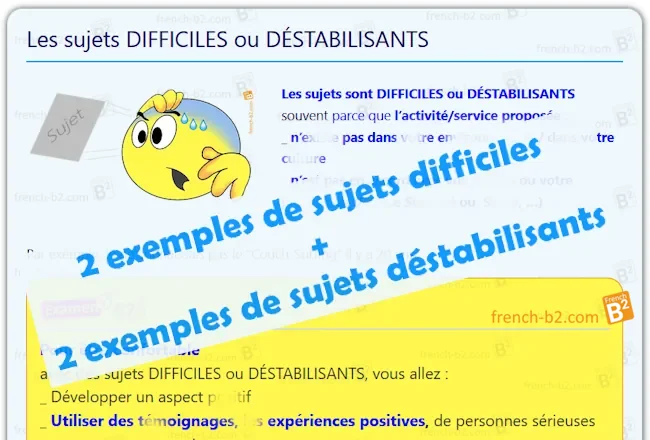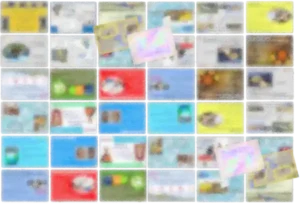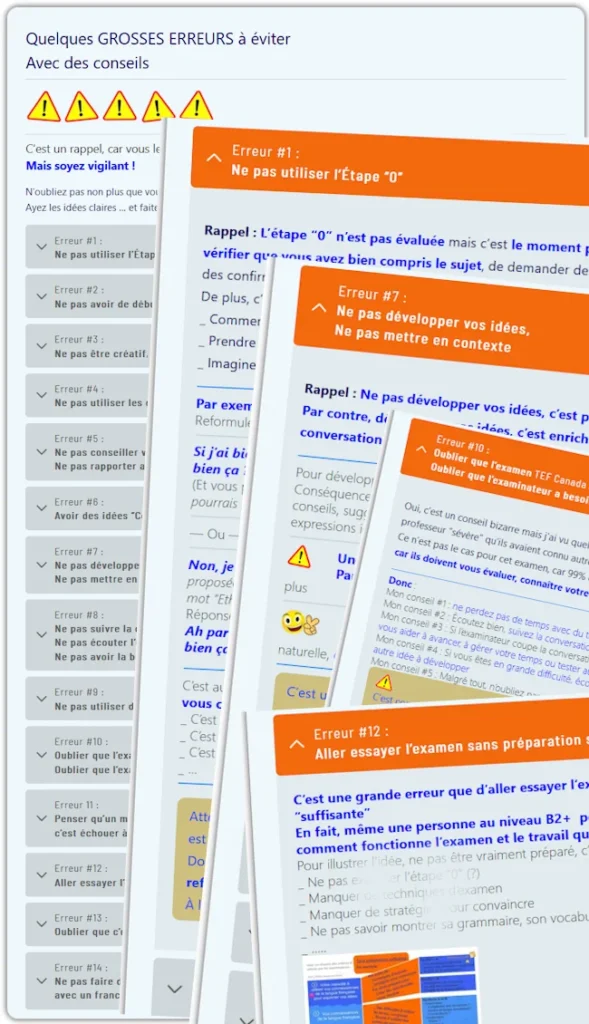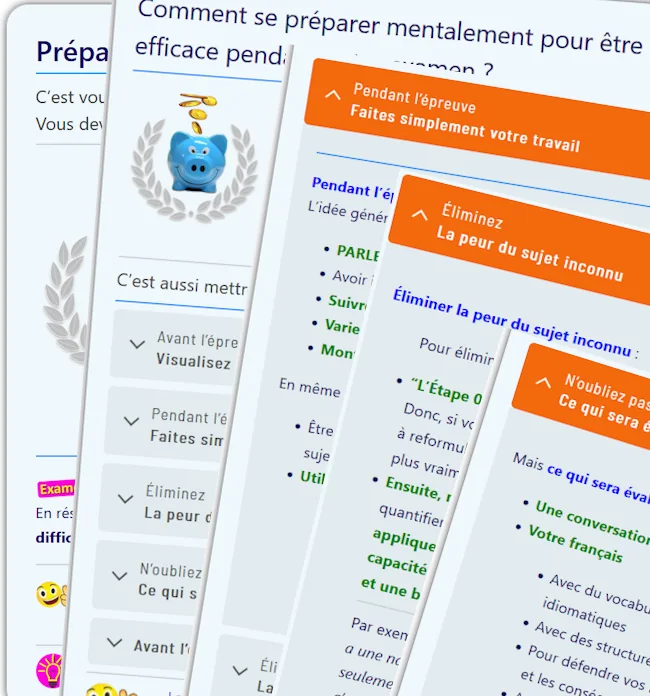Presentation of the preparation :
This oral expression preparation course is divided into 3 parts:
- Tests presentation Section A et Section B
- Preparing for the Section A test,
with over 30 representative subjects to practice Section A
with 10 corrected topics (and a detailed analysis of the corrected topics),
over 30 quizzes
18 downloadable cheat sheets (with associated vocabulary) - Preparing for the Section B test,
with over 30 representative subjects to practice Section B
with 10 corrected topics (and a detailed analysis of the corrected topics),
over 30 quizzes
more than 18 downloadable cheat sheets (with associated vocabulary)
See below for more details!
General comments :
What are the advantages of online preparation?
This preparation has been created to give support to my students who are often confronted with the constraints of life.
such as schedule constraints, budget management, the need to be organized for their courses and, of course, to pass their exam. What's more, as this TEF / TEFAQ exam preparation involves real-life situations, the fundamental spirit of this training is to learn a French that can be integrated into their real lives over the longer term.
Cela a encore plus de sens aujourd’hui.
Read on to learn more about the benefits of this course
This preparation has been created to bring together in one place the methodology and tools you need to prepare yourself properly 😎
At the same time, it provides you with corrected topics and very detailed analyses of these same corrected topics to help you progress, thinking like an examiner applying his evaluation grid. It's not the usual preparation that gives you the answers, points out mistakes and makes suggestions, without really giving you the tools you need to progress.
Put another way, after this course, if you watch a mock exam video (Level B2/B2+), you should be able to analyze the candidate's work, identify what he or she is doing well and also suggest priorities for improvement in order to succeed.
Thanks to this methodology and these tools, you'll make progress, understand the exam well and develop an analytical mind and techniques that will really boost your self-confidence and increase your chances of success.
Remember, the trick to the exam isn't just having the knowledge, it's having the knowledge and knowing how to show it to the examiner.
This is also one of the main goals of this course: to teach you how to seize opportunities to demonstrate your knowledge of French 😎
This preparation gives you a structure for your progress and flexible schedules at an affordable cost 😎
It's organized, structured, solid and efficient to help you pass your exam in control.
Modest cost does not mean compromise on quality 😎
This preparation targets B2/B2+ 😎
Preparation focuses on methodology and the tools needed to succeed at B2/B2+ level.
That's why the examples and answers presented are also at B2/B2+ level.
That's also why this course is not geared towards the more complex vocabulary of C1 level. However, you can add more complex vocabulary and turns of phrase, ... if you wish to move up to C1.
This course is therefore not suitable for those looking for universal B2/C1/(C2) preparation, with more complex corrected topics at C1/(C2) level.
A robust B2 is a necessary step towards achieving Level C1 😎
Indeed, if we analyse the levels in a simple way, we could characterize them as follows:
_ B1: You have some knowledge of French but don't really know how to use it. We can communicate simply
_ B2: You know how to use your knowledge. You feel comfortable and confident enough to communicate. You have more vocabulary, you've learned to express different communication intentions, you know how to obtain precise information and you know how to convince others. You have the tools and the method to communicate well. What's more, once you've mastered specific vocabulary, you'll feel more at ease and at a higher level in a routine environment (in everyday life or at work, for example).
C1: At this level, you can communicate with more nuance in more complex conversations. More turns of phrase are used, and the vocabulary is wider, more complex, with more complex tenses and carefully chosen connectors, ... . On the other hand, this more elaborate, more complex level of communication C1 builds on the methodology and tools acquired in level B2.
C1 is built on B2, which is why a poorly mastered B2 can be one of the factors limiting your progress and causing you to fail C1 several timeswith almost always the same final score, no matter how hard you work ... with lots of vocabulary and expressions.
The real goal of most of my students is the longer term 😎
Indeed, their first goal is to pass the exam, but their second goal is a solid B2/B2+ in order to have the necessary autonomy to better integrate their French into their life (Personal / Professional) and to continue to improve it after the exam (or at least, depending on their context, to keep the level acquired).
That's why you won't find any literary vocabulary here that isn't much used in real life.
For my students, it also means thinking about an immigration interview (sometimes 1 hour and months after the exam), a future job interview (often in English + French), a good job, a good salary, building a new life and integrating well into their new environment.
Leur objectif, c’est donc aussi d’avoir un français utile et ouvert, indispensable au-delà de l’examen … pour réussir 😎
To better understand what this preparation can do for you, take a look at the tabs below as well as the presentation of the training content 😎
You have to “Produce” and put it into action!
 By following this preparation program, you'll save the cost of the hours of tutoring you'd need to acquire the methodology, tools and knowledge explained here. However, before taking the exam, you need to put your knowledge into practice through simulations. It's essential! 😎
By following this preparation program, you'll save the cost of the hours of tutoring you'd need to acquire the methodology, tools and knowledge explained here. However, before taking the exam, you need to put your knowledge into practice through simulations. It's essential! 😎
Some students run simulations with other students (or a tutor) during their preparation and with a tutor at the end of their preparation (starting early is the best solution).
Others prefer to run simulations with a tutor after completing their training.
Others prefer to complete a week-long in-school course with intensive simulations...
Others, who already know how to express themselves at B2 level, immediately attempt the exam.
In the vast majority of cases, it's necessary to put yourself in an exam situation and evaluate your performance. That's why you need to test your oral expression and do some simulations with a French-speaking person. This person must be familiar with the exam and be able to identify your mistakes/weakenesses and help you correct them.. Another benefit for you is to put a bit of stress on yourself and to see how you react under test conditions 😎
B1+/B2 -> RUSH![]()
You're not ready, your level is B1 or B2, your target is B2 and you don't have enough time to prepare.
The ideal is to hire a tutor who knows the exam inside out and can help you make rapid progress. On the other hand,
For those with budgetary or scheduling constraints, and for those who also like to have written support, this course can help you.
Thanks to this preparation, you'll know the format of the tests, and have a methodology, techniques and strategies to apply during the exam.
Without this knowledge, even if you have level B2, you may fail.
Here are a few quick tips to adapt to your situation :
If you have the Niveau B1 ou B2 : Your conversation should be as “natural” as possible
If you have the Niveau B2 :
Understand the tests, exam methodology and techniques, and how you will be assessed. Review questions and persuasive techniques. Check your ability to express your communication intentions. Then learn how to create opportunities for yourself to demonstrate your knowledge of French..
Try to look at all the chapters in this course, even very quickly, because you may have Level B2 knowledge but not know how to use it or show it in exam conditions.
 To really increase your chances, you should also do some simulations with a French-speaking person who knows the exam well and who is able to correct you, taking into account your level + the preparation time available.
To really increase your chances, you should also do some simulations with a French-speaking person who knows the exam well and who is able to correct you, taking into account your level + the preparation time available.
If you decide to take on a tutor, start as soon as possible, depending on your budget, but don't wait until the last moment! 😎
If you have the Niveau B1 :
If you've already registered for the exam, your aim will be to optimize the use of your current knowledge and compensate for any major weaknesses. In all cases, you need to make choices and limit your ambitions.
Even if it's difficult to give you good advice without knowing you:
For Section A and Section B :
Start by looking at a few corrected topics and their analyses, identify your weaknesses and prioritize them, because it will be impossible to do everything.
Section A: Learn how to ask questions on the main themes (explained in this training course)
Section B: You need to learn how to develop your ideas and have several techniques for convincing people (explained in this preparation).
Learn how to properly express causes and consequences
 At B1 level, if you want to increase your chances, immediately find a tutor who knows the exam inside out, and who can prioritize and help you, taking into account your level, your personality and the preparation time available.
At B1 level, if you want to increase your chances, immediately find a tutor who knows the exam inside out, and who can prioritize and help you, taking into account your level, your personality and the preparation time available.
If you decide to take on a tutor, start as soon as possible, depending on your budget, but don't wait until the last moment! 😎
Nothing will be perfection, but fight for your chance!
It's an important success factor! 😉
B1/B2 to EXAM
B1/B2 to EXAM
Your goal is B2, you have the time and you want to prepare by yourself
Some suggestions (to be adapted to your level) :
Do all !
Start by reading the general presentation of the two tests.
After that, I'd advise you to look at the other 2 courses (Preparation Section A and Preparation Section B) very quickly, and look at some of the corrected topics to get a general idea of what you're aiming for.
Then organize yourself step by step for each course.
Download cheat sheets and take notes
Take the time to think about how you can use each piece of knowledge you've learned (both during tests and in real life).
If you're lucky enough to be in a French-speaking environment (at work, for example), prioritize what you can start using immediately. The aim is to practice in real-life situations 😎
If you have a B1 level :![]() During your preparation, practice as much as you can, and at the end of your preparation, do some complete simulations to put you in exam condition. Take on a French-speaking person who is familiar with the exam and can help you correct any mistakes or weaknesses.
During your preparation, practice as much as you can, and at the end of your preparation, do some complete simulations to put you in exam condition. Take on a French-speaking person who is familiar with the exam and can help you correct any mistakes or weaknesses.
Take advantage of every possible opportunity to practice (discussion groups, activities in French, etc.). Please note: be careful in your choices, as your goal is B2/B2+! 😎
If you have a B2 level : and you want to put all the chances on your side:
![]() Please note : don't be too confident because, to pass your exam, you need to know the format of the tests, as well as the methodology, techniques and strategies to apply during the exam.
Please note : don't be too confident because, to pass your exam, you need to know the format of the tests, as well as the methodology, techniques and strategies to apply during the exam.
Without this knowledge, and even if you have level B2, you can fail.
You should also do some simulations with a French-speaking person who knows the exam really well, to check that you're using the right exam techniques, persuasive strategies and possible mistakes. You'll also benefit from putting yourself under a bit of stress and seeing how you react under exam conditions.
B1 to B2 SiMU
You want to prepare for level B2 and then do intensive simulations with a tutor or in a school.
The idea, with the preparation suggested here, is to prepare yourself in advance in order to be efficient and to get the maximum benefit from your hours of intensive simulations.
For those with level B1 or B2 :
Thanks to this preparation you will :
Review all the theory you need to know, with plenty of exam situations
_ Prepare you for the tests.
_ Practice on representative topics, with corrected topics and analysis of them
_ Develop techniques and strategies
_ Know all the tools and techniques to use during your exam
_ Use downloadable cheat sheets to help you
What's more, you'll save the hours of tutoring that would otherwise be needed to acquire the tools and knowledge explained here.
It's economical, and then you can optimize your hours of intensive simulations 😎
An advice :![]() To make the most of intensive simulations with a tutor or in a school,
To make the most of intensive simulations with a tutor or in a school,
During your online preparation, practice as much as possible at your own level with a French-speaking person (or with a friend doing the same preparation). Even if it's a modest one, it'll be excellent.
Take advantage of every possible opportunity to practice (discussion groups, activities in French, etc.). Be careful: be demanding in your choices, because your goal is B2/B2+ 😎
Review For LIFE
Revise French for everyday life and work
Perhaps this preparation can help you, because the TEF / TEFAQ is like life itself. : you need to obtain accurate information, convince, debate and, at the same time, engage in natural conversation.
So, if you already can communicate in French and your level is B1 or an unreliable B2, this preparation can help you get back to reviewing concepts at Level B2. Take a look at the course content presentation below to make your decision.
 If you already live in a French-speaking environment, analyze the opportunities you have to practice and prioritize what will help you dive in. For the others, try to find another way to immerse yourself in real conversations (discussion groups, activities in French, sports, hobbies, TV series, etc.).
If you already live in a French-speaking environment, analyze the opportunities you have to practice and prioritize what will help you dive in. For the others, try to find another way to immerse yourself in real conversations (discussion groups, activities in French, sports, hobbies, TV series, etc.).
In any case, you need to produce regularly to integrate the language. At the same time, if possible, try to diversify your environment to practice in different contexts and at different levels/challenges. Regular practice is the key to success!
A more detailed presentation of the preparation :
1ʳᵉ Part: Course C01 :
2ᵉ Part: Course C02 :
Test preparation Section A
(With topics representative of the exam)

0/ Section A preparation plan
The aim is to explain how the preparation is organized (with the number of each lesson).
It also gives you the reference points you need to go straight to a lesson, or to come back and revise a lesson you've already seen.
For your information, here is a general outline of the course organization: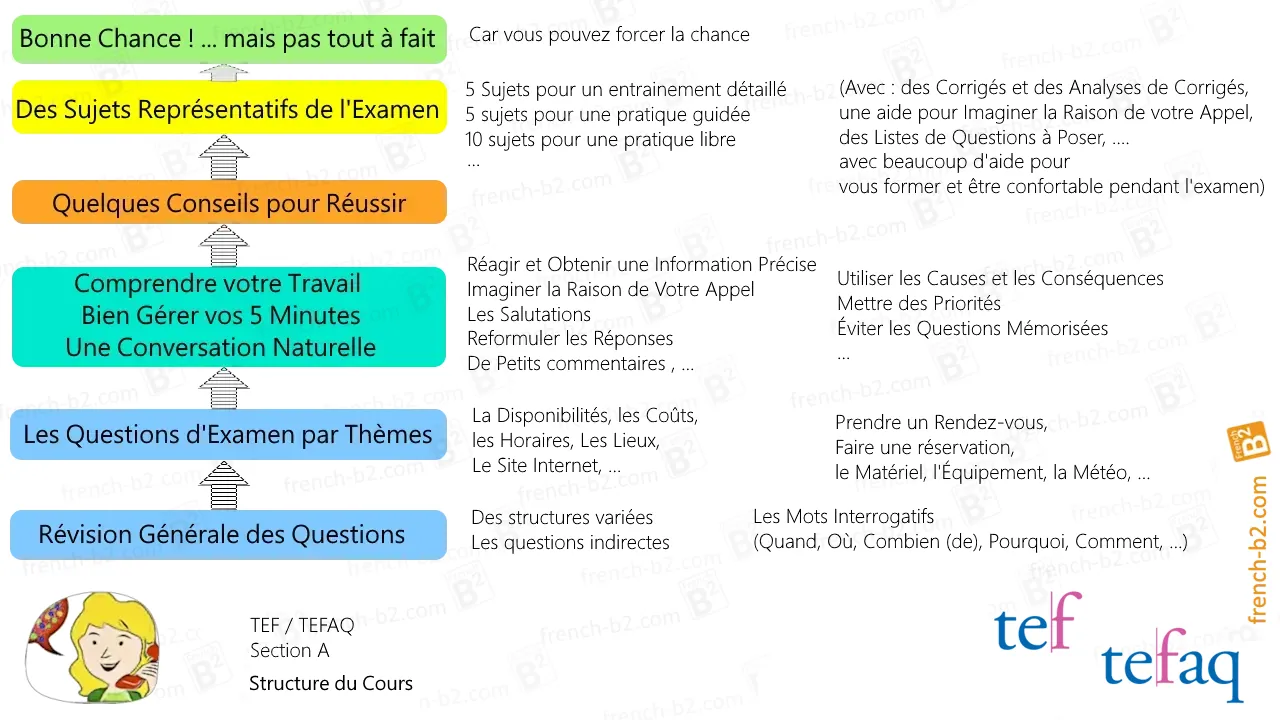
1/ A general review of how to ask questions
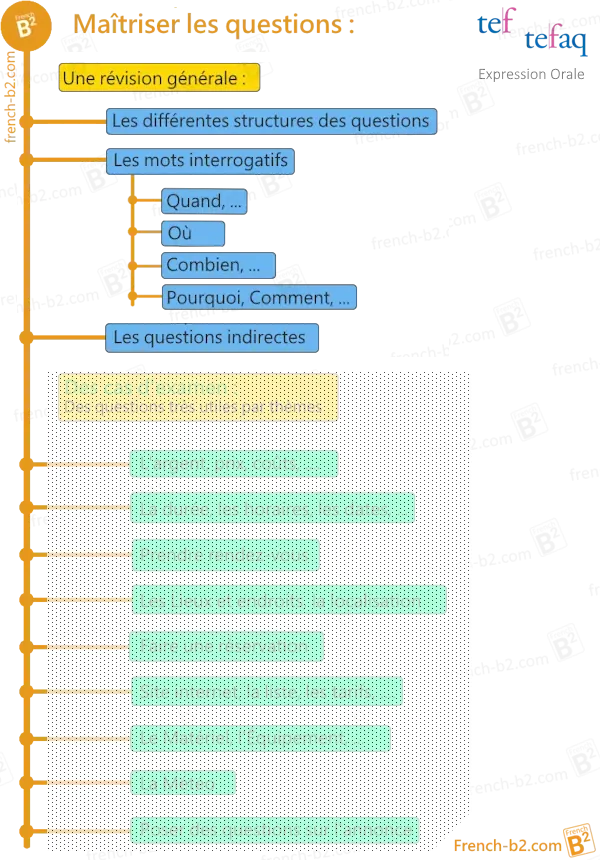
This is a grammar- and vocabulary-oriented review on :
_ How to ask questions
_ What do you have to show during the test?
_ The use of :
_ various structures for asking questions (different question styles),
_ interrogative words (Where, when, how, why, how much, ... and a little more),
_ indirect questions
_ …
With examples and exercises with quizzes
and downloadable cheat sheets
2/ A review of exam questions on major themes
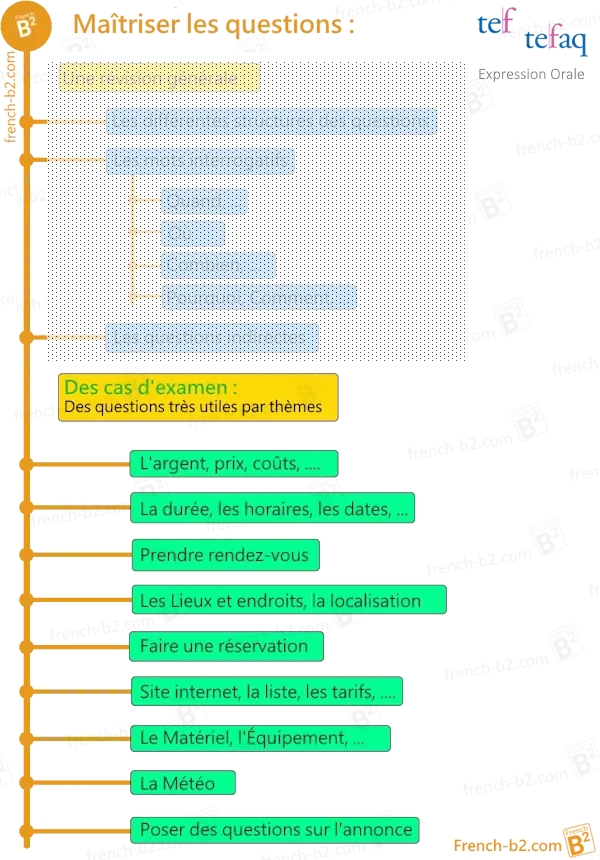
This is a review of questions by theme.
This is probably revise 60-80% of the questions you will ask on the exam
_ With related vocabulary
_ In an examination context
_ With quizzes to practice
_ And downloadable cheat sheets
It also means learning how to ask precise questions to obtain accurate information and earn points.
3/ Learn and develop exam techniques and tips for success
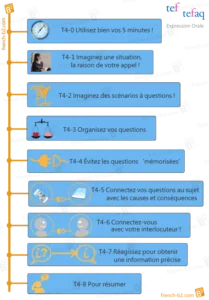
This lesson is for developing examination techniques.
Thanks to them, you'll be able to :
_ Have many questions naturally
_ Learn how to manage your 5 minutes
_ Have a natural conversation
_ Highlighting your French
This is what you need to know and use to manage your test and succeed
4/ Tips on how to pass your test
In this lesson you will find :
_ 13 important tips for a successful test and one big mistake to avoid
_ A reminder linked to the evaluation criteria
5/ Detailed training for the Section A test
With 5 topics representative of the exam
For each topic you will find :
* 1 training exercise and corrected topic (Based on a list of 15 to 25 questions to ask on the topic)
* 1 corrected topic (With examiner/candidate dialogue)
+ a detailed analysis of this corrected topic to speed up your progress
+ comments or suggestions for improvement
Thanks to this detailed training, you'll know how to manage your test and what you need to do to succeed.
It gives you autonomy in your preparation
6/ Guided practice
With 5 topics representative of the exam
And for each topic you have :
* 1 training exercise (15 to 25 questions to ask on the topic, without dialogue)
* 1 long corrected version (With open-ended dialogue and lots of questions)
* 1 short corrected topic (With dialogue and limited time, just like on the exam)
In theory, once you've finished this chapter, you'll have enough knowledge to manage your exam and practice on your own.
7/ Practice freely
Here you have more than 20 representative chosen topics for free practice
That's enough to familiarize you with different types of subject and to start feeling confident.
And if you add :
_ the 5 training topics
_ the 5 guided practice topics
Together, you've already got over 30 topics to prepare for Section A (D’autres sont à venir)
8/ The big mistakes to avoid
Here you'll find important tips on how to be efficient and give yourself the best chance of success
Such as :
_ Keeping the right attitude
_ 7 big mistakes to avoid during the test
_ Tips for before and during the exam
These tips are based on real-life situations and sometimes on stupid failures of well-prepared people. It can happen, ... even to good people. That's why nothing should be neglected.
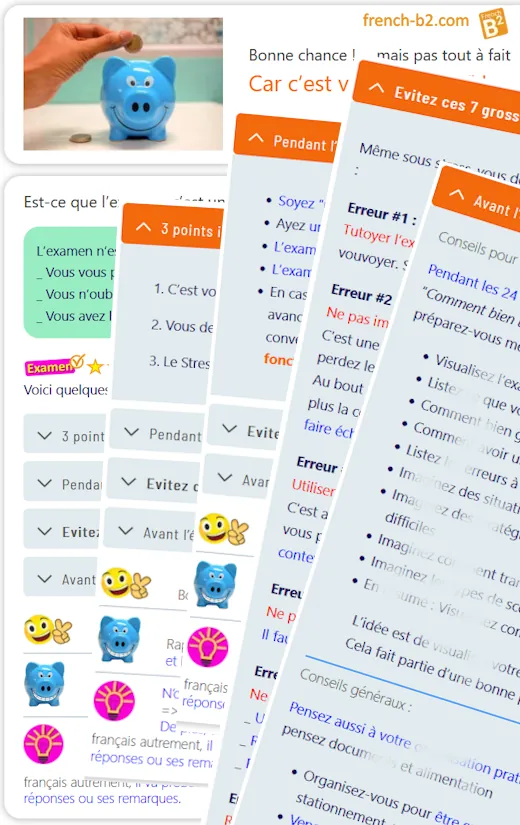
3ᵉ Part: Course C03 :
Test preparation Section B
(With topics representative of the exam)

0/ Section B preparation plan
The aim is to explain how the preparation is organized (with the number of each lesson).
It also gives you the reference points you need to go straight to a lesson, or to come back and revise a lesson you've already seen.
For your information, here is a general outline of the course organization: 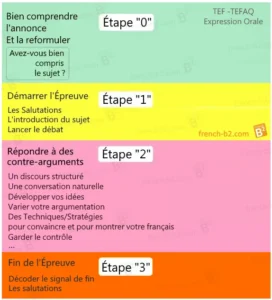
1/ A review of very useful skills for the exam
The aim of this lesson is to review or learn how to express different communication intentions such as :
_ causes and consequences,
_ the goal,
_ doubt, certainty and probability
(With explanations on the use of the subjunctive in exam situations)
_ opposition and concession
_ emphasizing
_ express an opinion, report an opinion or ask for an opinion
(And examples of how to use the subjunctive in real exam situations)
_ listing the benefits
_ …
All this while expressing yourself in a friendly way to your friend, using appropriate vocabulary.
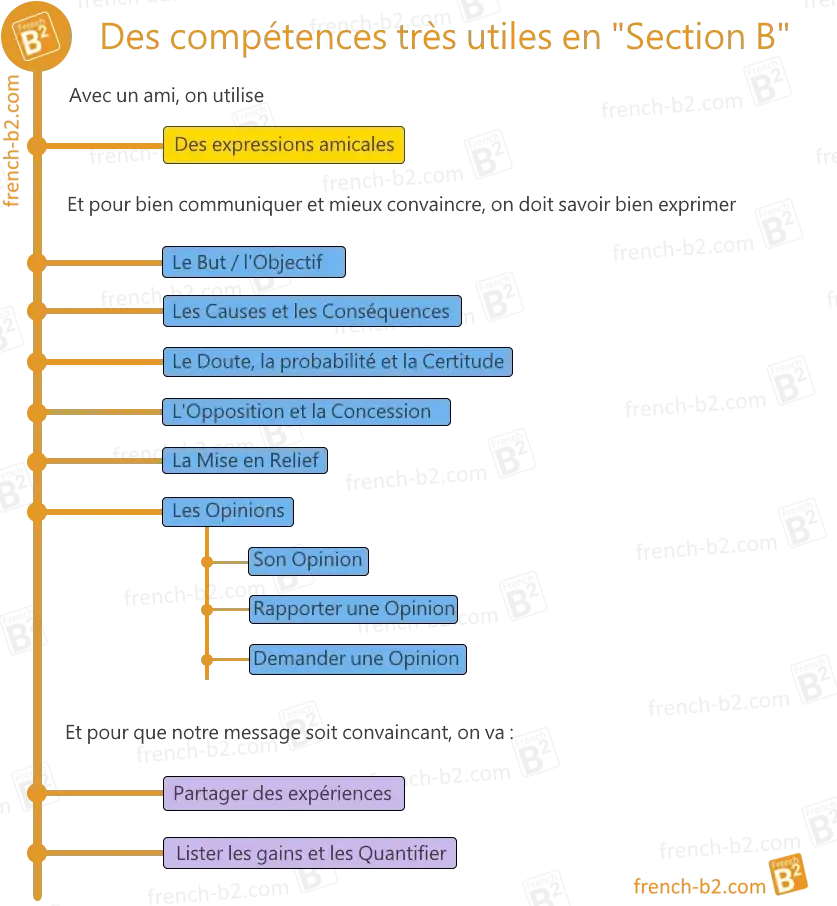
All of these points are addressed with a wide range of exam situations
With examples of complex tenses in exam situations.
(Conditionnel présent (Passé), subjonctif présent, plus-que-parfait, gérondif (Participe présent) avec un rappel du futur simple)
2/ Learn and develop exam techniques and convincing techniques
(With numerous examples useful for the exam)
The aim of this lesson is to review or learn techniques or strategies to :
_ Have ideas naturally
_ Manage your time
_ Have a natural conversation
_ Convince your friend
_ Respond to a counter-argument with different strategies,
_ Show your French
_ …
Thanks to these techniques and strategies, you will be able to create opportunities to convince your friend.
It will also give us opportunities to to express different communication intentions and show off your French (Expressing causes and consequences, doubt and certainty, opposition and concession, emphasis, expressing or reporting an opinion, "earnings", ...)
3/ Detailed training with 5 representative exam topics
It's step-by-step training, with lists of counter-arguments, an corrected topics and an analysis of these corrected topics
Everything is very detailed with examples for each step and for each micro-step shown in this drawing. 
For each subject, you also have :
- A given examination context (for Steps 0 to 3)
- A list of counter-arguments to which you must respond
(With a sample answer key for each counter-argument) - A corrected topic
- A very detailed analysis of corrected topic based on different evaluation criteria => What's missing ?
- Advice or suggestions for improvement (or possible options)
This training is an application of the previous lessons and is designed to help you :
- To understand your work during each step (or micro-step) of the examination
- To integrate the necessary techniques and tools To manage your test
- To organize your work and your progress
- To manage your time
- To take control of your test and do your work
- To understand why an "imperfect" work can be a winner
- To understand how you can improve
- To gain self-confidence
Here you also learn how to ”How to deal with the unknown topic" so much feared
This lesson also aims to give you the autonomy you need to manage your test
4/ Guided practice
With 5 topics representative of the exam
For each subject, you are always guided in successive steps, with exercises and/or suggestions :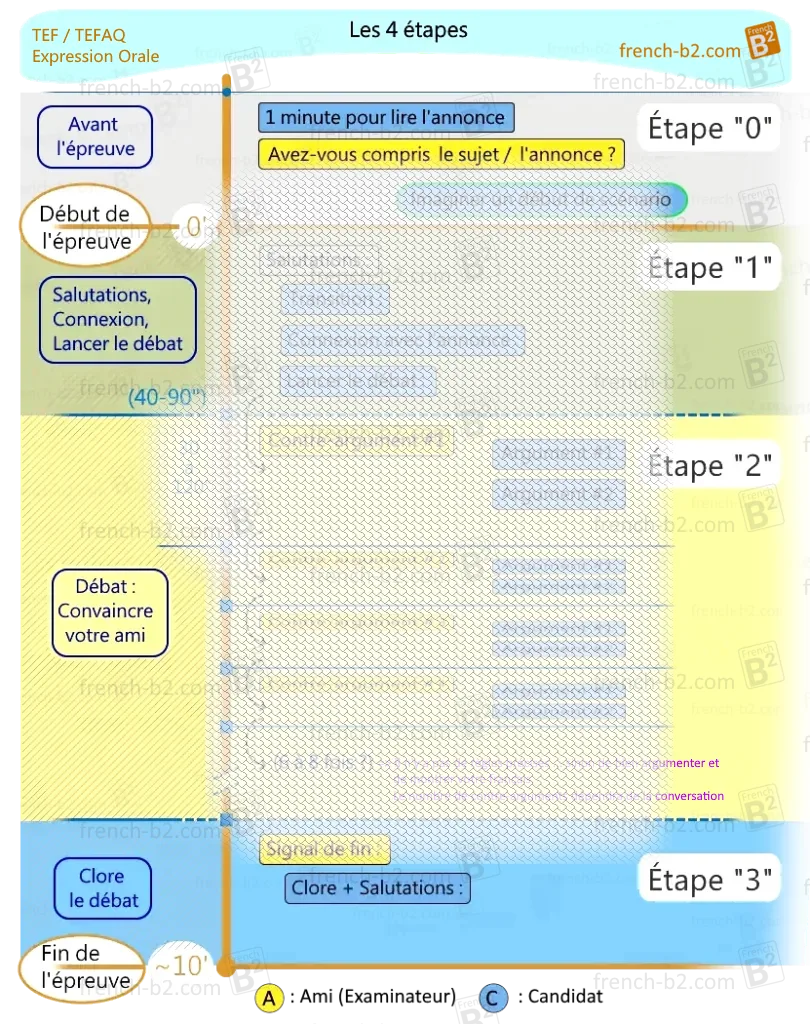
- Step “0”: Do you understand the subject? => How to react, how to imagine the beginning of a scenario?
- Step “1”: Respond to your friend's greeting and introduce / present the topic
- Step “2”: You are suggested a scenario and your friend gives you counter-arguments. :
_ For each counter-argument, ideas for answers are proposed
_ You must respond to each counter-argument - Step “3”: Decode the end signal given by the examiner and say goodbye
At the end of each topic you have :
- A corrected topic
- An analysis of the corrected topic according to different evaluation criteria
The aim is to practice all the steps of the examto improve your technique and take control of your production
5/ Tips for “SPECIFIC”, “DIFFICULT” or “DISABILITATING” topics
In this lesson you will find tips for 4 topic families
(Volunteering, Health, Environment and topics often classified as “Difficult or Sensitive")
The aim of this lesson is to :
_ Show you some specific characteristics of these types of topics
_ Give you tips on how to manage these types of topics
_ Help you to remain efficient during the exam
6/ Practice freely
You have more than 20 representative subjects chosen to practice the test freely and prepare well for the exam.
As with Section A, it's a mix of selected topics, and that's enough to start feeling confident.
In addition, if you add :
_ the 5 training topics
_ the 5 guided practice topics
Together, you've already got over 30 topics to prepare for Section B (D’autres sont à venir)
Included in these 20+ topics are the 7 special topics (Volunteering, Health, Environment and topics classified as “Difficult or Delicate”) which have been used to explain the particularities and give some ideas for dealing with difficult or delicate topics in a fairly straightforward manner.
7/ 14 BIG MISTAKES to avoid
In this lesson you will find a reminder of 14 common mistakes to avoid
With tips on how to avoid or cope with them 😎
8/ SUCCESS: A few tips to help you prepare for success
The aim of this lesson is to help you make the most of your chances to be efficient and win points.
These are tips to remind you:
_ How to prepare yourself to manage your test and make the most of your knowledge
_ How to have a winning attitude
_ How to manage your stress
_ How to reach your goal
Nothing extraordinary, just common sense but from a different angle, and it's appreciated by students who want to make the most of their knowledge during the exam.
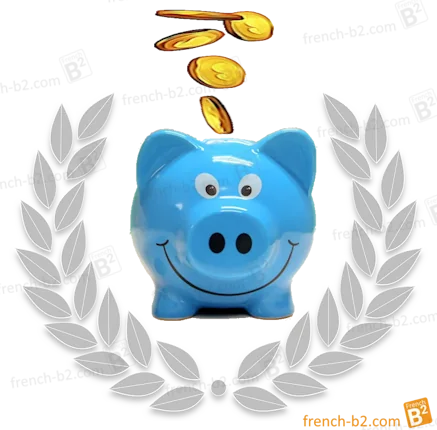
Voilà !
It was the presentation of this preparation.
If you have any questions or comments, contact me at HERE (subject : “Make a suggestion”)
Bonnes fêtes de fin d’année !

